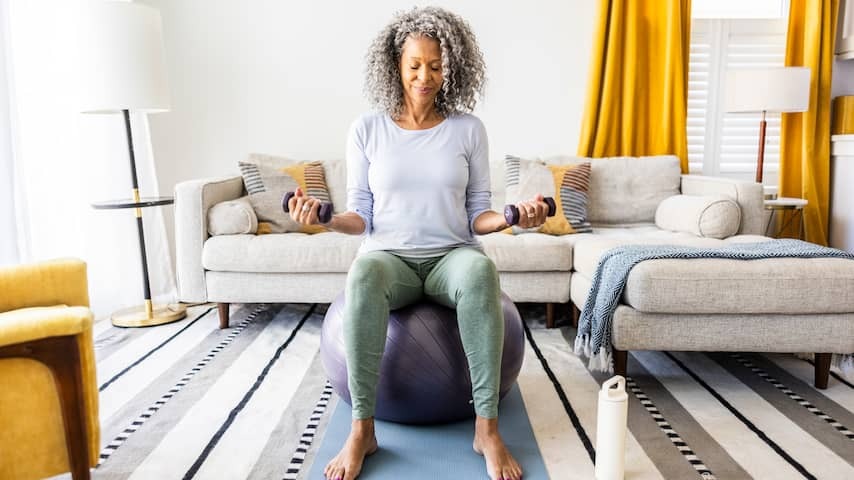
Moving beyond your sixties probably feels different than when you were twenty. Do you want to spend your remaining years as much as possible without ailments, mental complaints, fatigue, and other old-age malaise? Then pick up those weights now and get moving, say sports experts.
It’s never too late, says sports scientist Bas van Hooren. “Research among centenarians shows that you can still build muscle mass even at that age. The body still responds when you start training. Even if you are a hundred.”
A healthy amount of muscle mass protects against obesity and diabetes and ensures healthy joints, more strength, a stronger immune system, more energy, and higher bone density. As we get older, that’s exactly what you need, says Van Hooren.
The aging effects of our body demotivate us to get moving. Training feels heavier because your heart slowly deteriorates, which reduces your maximum oxygen uptake and therefore your exercise capacity. The joints become stiffer and the tendons will lose their elasticity. After your thirties you lose muscle mass and from your sixties your resting metabolism also declines, causing you to gain weight faster.
Sport is important for every aspect of our well-being, says Van Hooren, but from about halfway through their thirties many people start moving a lot less. They have children, work a lot, have no energy and don’t make time.
He understands the human tendency not to exercise: people naturally want to conserve their energy for when they really need it. “That is determined by evolution. But we no longer need that standby mode. The result is that many people sit on the couch, don’t move and don’t feel fit, healthy or happy.”
“Research shows that you recover slightly less quickly after a heavy workout at an older age, and you also have to be careful about muscle damage and injuries when you are older. This means that many older people do not want to take the risk of exercising.”
Leave your croptop at home
There are even more barriers, says personal trainer Ruth Vis. “Older people can find the gym intimidating with all those fit, young people. Furthermore, the menopause can cause mental complaints, which prevent you from getting off the couch. And hormonal changes make you more tired, making exercise increasingly difficult.”
“Do it anyway. You quickly notice the difference. Climbing stairs becomes easier, as does carrying your groceries. You sleep better, you have fewer aches and pains, you feel more relaxed.”
According to Vis, the goal of exercising at a later age is not to become some sports god or goddess who steals the show in a croptop in the gym. “You want to spend the remaining years a little pleasantly with as few aches and pains as possible. Exercise will ensure that.”
But it becomes more difficult as we get older and the bones become more fragile, the heart becomes weaker and the muscles become less powerful. Vis: “If you don’t know what it will bring you and how much better you will feel, that makes sense. It also costs time and energy.”
But how do you start? All movement is good. Something is always better than nothing, both sports experts say. So go for a walk, cycle, swim – do what you enjoy. But if you get older and therefore become stiffer, slower, less powerful and more tired, you need to put your muscles to work, says Vis. “Train with weights and do that one to two times a week.”
Stronger bones, tendons and muscles
Strength training in combination with endurance training – sports that make your heart beat faster and your breathing accelerate – can ensure that you can really spend your last years fit, says Van Hooren based on scientific research.
“By training with weights, your bones and tendons get a good stimulus to become stronger. After just a few weeks of training, we see an increase in bone strength, tendon strength and muscle strength. That really improves the quality of your life.”
Vis only trains women. Many of them are approaching or are in menopause. “Many menopausal symptoms can be overcome by exercising. For many women, it really feels like they have to climb a huge mountain. By exercising every day and doing strength training about twice a week, you feel a lot fitter. You sleep better, you feel better mentally, you worry less. You work on the fat storage around your stomach that often becomes larger during that period.”
Avoid sports that involve many quick, unexpected movements if you are older and do not start untrained with injury-prone sports such as running and football. But participating in Nederland in Beweging, swimming, rowing in the gym, walking, cycling: it’s all good in combination with some strength training, says Van Hooren. “Anything is better than sitting on the couch.”